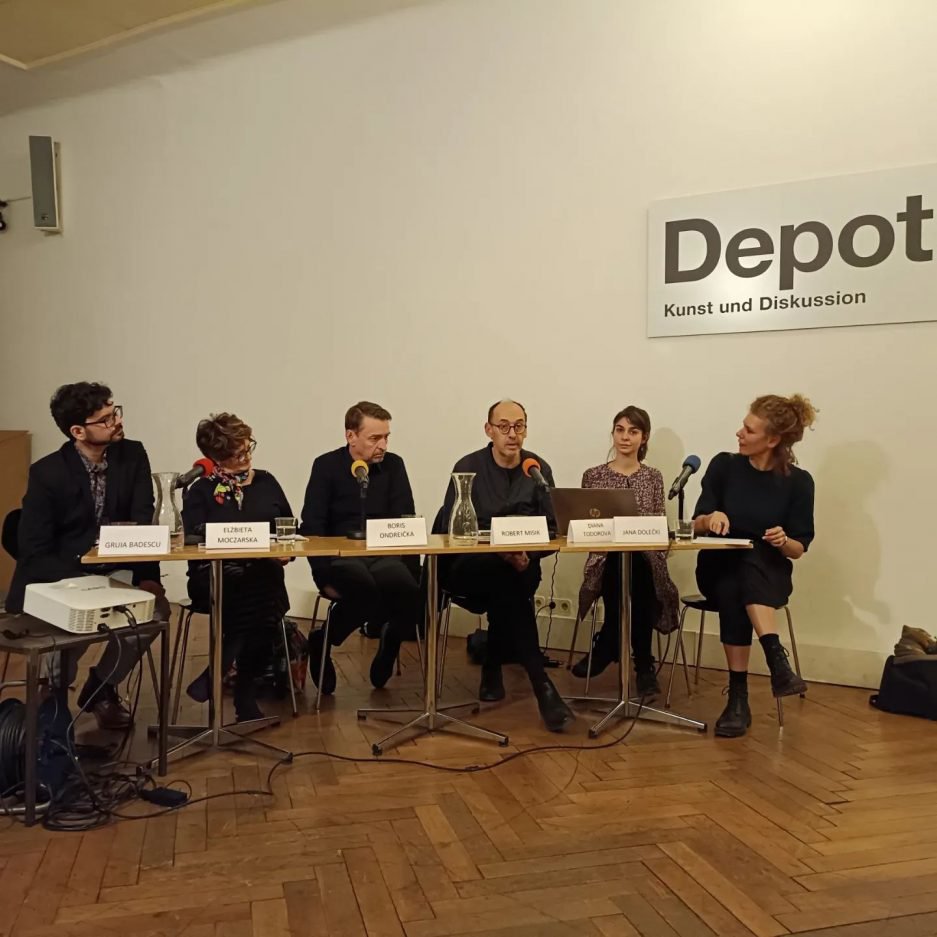Completion of the International Forum “The democratic revolutions of 1989 in popular culture and art”

The International Forum “The democratic revolutions of 1989 in popular culture and art” took place from February 14 until February 18, 2022.
The event was organized in a hybrid format with its first four sessions taking place on Zoom on February 14 and 15, and the last session happening in person in Vienna, Austria, on February 17, while also being streamed on Zoom for the participants of the Forum.
The Forum was opened with the introductory session „How did 1989 change Europe?“ on February 14. Diana Todorova, Documenta, the coordinator of the project, briefly presented the project, its main ideas, activities, and results.
After the presentation, there was a screening of the educational film “How did 1989 change Europe?”, one of the project’s results. The film collects personal memories of the period of democratic changes that took place in 1989 and the transition to democracy and a free-market economy that followed in the 1990s.
After the screening of the film, Todorova presented several artistic interpretations of the democratic changes of 1989. In her presentation she focused on three examples of the connection between politics, art, 1989, East and West: „Wall of oil barrels / the Iron curtain” by the artistic duo Christo and Jeanne-Claude, the Singing Revolution in Estonia, and the graffiti painting by Dmitri Vrubel “My God, help me to survive this deadly love”.
The second session of the Forum „1989 and photography: democratic revolutions through the lenses” was moderated by Eva Kovač, Blockfrei. The session introduced several aspects of the relationship between politics and photography at the end of the 1980s and the 1990s. In the first part of the session, Kovač led a conversation with Dejan Sluga, a curator from Slovenia. Kovač and Sluga were discussing the exhibition “Solace of Memory – How we survived communism and even laughed”.
In the second part of the session Jana Dolečki, Blockfrei, introduced the work of photographer Mirko Krizanovic. In January Dolečki made an audio interview with Krizanovic in which he describes his personal and professional experience of 1989. Combining the audio recording in German and adding the photographs Krizanovic took during the democratic transitions together with subtitles in English, Jana Dolečki created a short video. During the session, the participants of the Forum watched the video which gives inside on the role of photography in the historical developments at the time. After the screening, Kovač discussed Krizanovic’s experience with Dejan Sluga and then opened the floor for questions from the participants of the Forum.
The International Forum continued the next day, February 15. The third session „Teaching revolutions: educational challenges and correlations“ gave the participants of the Forum an opportunity to compare the challenges of teaching about the democratic revolutions in Europe.
Diana Todorova, Documenta, made a short overview of the Seminar for history educators (September 22-26, 2021) which was organized in Thessaloniki, Greece, in the scope of the project. Todorova also presented some of the challenges that the educators who took part in the Seminar listed during the discussions in Thessaloniki – lack of didactic materials; lack of consensus in society and politics regarding 1989; subjective teaching; curricula’s restrictions, etc.
Then, Gruia Badescu, CRIDL, commented on the current challenges of teaching about 1989 in Romania. Badescu presented the workshops which CRIDL organized in the scope of the project in Romania using the results of the project – the educational film „How did 1989 change Europe?“ and the manual with didactic materials „1989: a lesson from the past“. The manual was then presented in detail by Tena Banjeglav, Documenta.
Elżbieta Moczarska, The Kazimierz and Zofia Moczarscy Foundation, joined the discussion as well. Moczarska commented on the importance of 1989 in the culture of remembrance in Poland and shared her experience of working with youth on the topic of the democratic transitions in Europe.
After a short break, the fourth session „1989 and mass media: the revolution was televised“ followed. In her presentation, Diana Todorova, who was working as a TV journalist before joining Documenta and has a Bachelor’s degree in Journalism, explored the social and political impact of television during the democratic changes of 1989 in different European countries. The participants of the Forum were presented with selected TV archives from Poland, Croatia, Romania, Germany, and other countries. After the presentation, there was a discussion with the participants of the Forum who shared their opinions on the role of mass media in the democratic changes in Europe.
The fifth session of the Forum “The democratic revolutions of 1989 in art and everyday life” was organized in person in Vienna in the format of public discussion and was streamed on Zoom for the participants of the International Forum.
Jana Dolečki, Blockfrei, moderated the discussion which brought together Boris Ondreička, art professional; Robert Misik, journalist; Diana Todorova, Documenta, journalist; Gruia Badescu, CRIDL, a Zukunftskolleg Research Fellow at the University of Konstanz and Elzbieta Moczarska, The Kazimierz and Zofia Moczarscy Foundation, civil society educator.
After each of the panelists shared their personal experience of 1989, Robert Misik described the political situation in Austria in 1989 and talked about the significance of the Pan-European Picnic focusing on misconceptions about the event. After that Boris Ondreička shared his pre-1989 experience of being a young punk musician in Slovakia. Gruia Badescu contributed to the discussion with remarks on how public space in Bucharest commemorates the democratic revolution in Romania. Elzbieta Moczarska shared her perspective on 1989 and the place this year occupies in literature, film, and art. Diana Todorova talked about how 1989 transformed everyday life and the cultural scene in Bulgaria where she was born. After that Dolečki opened the floor for questions from the audience in Vienna and on Zoom. With the end of the discussion, the program of the International Forum was completed.
You can find more information about the Forum in the detailed report bellow.
The International Forum is part of the project “Reshaping the image of democratic revolutions 1989: European contemporary perspectives and forgotten lessons from the past”. Follow us on Instagram: @reshaping1989
The project is co-financed by the European Union through the program “Europe for Citizens”.

